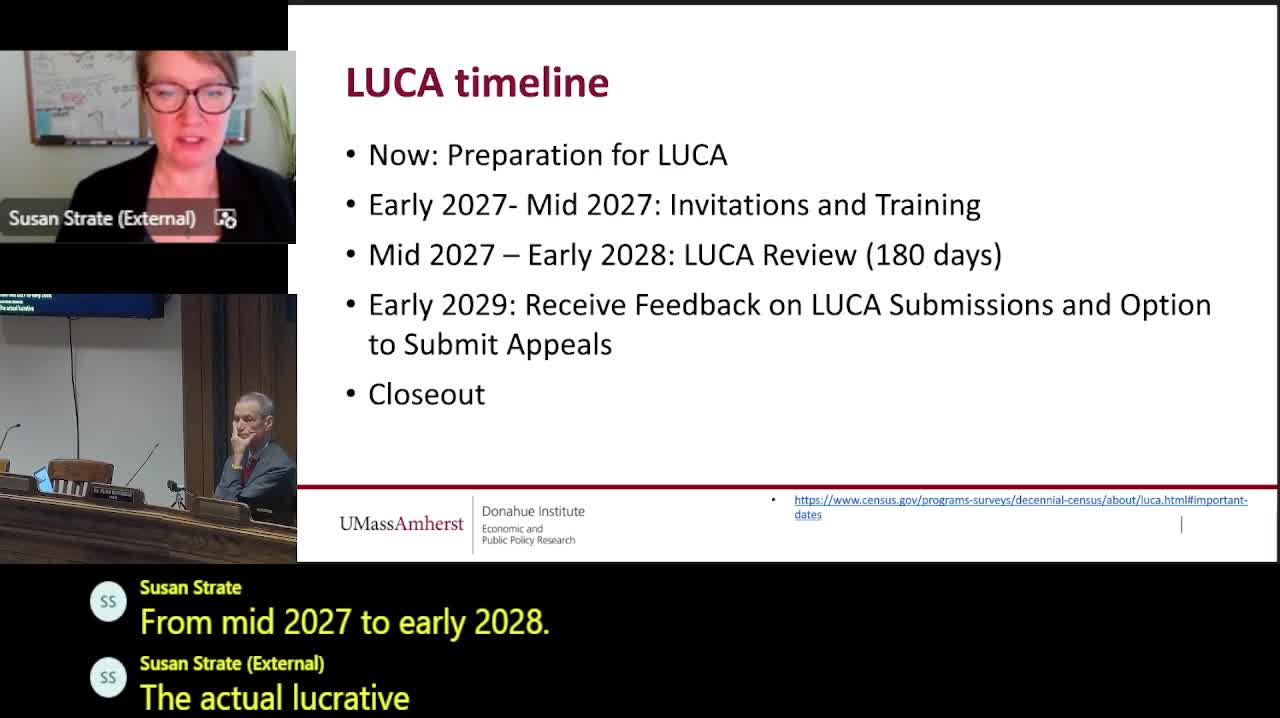MassGIS Prepares Master Address Database for 2029 Census Review Process
September 22, 2025 | 2025 Legislature MA, Massachusetts
This article was created by AI summarizing key points discussed. AI makes mistakes, so for full details and context, please refer to the video of the full meeting. Please report any errors so we can fix them. Report an error »

The Massachusetts Senate Committee on the Census convened on September 22, 2025, to discuss critical preparations for the upcoming Local Update of Census Addresses (LUCA) program. This initiative aims to ensure accurate address listings for the 2030 Census, which is vital for effective representation and resource allocation across the state.
During the meeting, officials outlined a timeline for the LUCA process, emphasizing that designated reviewers will have 180 days to compare address lists and submit any missing addresses. By early 2029, municipalities will receive feedback on their submissions, along with the opportunity to appeal any discrepancies. This structured timeline is designed to enhance the accuracy of the Census data, which directly impacts federal funding and local governance.
A significant focus of the discussion was on outreach efforts to inform cities and towns about the LUCA program. Officials stressed the importance of identifying local reviewers who can assist in pinpointing areas of housing growth or decline. This proactive approach aims to create a comprehensive statewide address list that reflects current residential statuses.
To support this initiative, the committee is developing tools and resources, including a Master Address Database (MAD) sourced from E911 data. This database will be crucial for identifying residential addresses and ensuring that all structures are accounted for in the Census. The committee also plans to standardize address codes across the state to streamline the review process.
In addition to residential addresses, the committee is working on compiling a group quarters inventory, which includes facilities like nursing homes and student housing. This comprehensive data collection is essential for capturing the full scope of the population in the upcoming Census.
The meeting underscored the importance of accurate data collection for the future of Massachusetts communities. As the state prepares for the LUCA program, officials are committed to ensuring that every resident is counted, which will have lasting implications for representation and resource distribution in the years to come.
During the meeting, officials outlined a timeline for the LUCA process, emphasizing that designated reviewers will have 180 days to compare address lists and submit any missing addresses. By early 2029, municipalities will receive feedback on their submissions, along with the opportunity to appeal any discrepancies. This structured timeline is designed to enhance the accuracy of the Census data, which directly impacts federal funding and local governance.
A significant focus of the discussion was on outreach efforts to inform cities and towns about the LUCA program. Officials stressed the importance of identifying local reviewers who can assist in pinpointing areas of housing growth or decline. This proactive approach aims to create a comprehensive statewide address list that reflects current residential statuses.
To support this initiative, the committee is developing tools and resources, including a Master Address Database (MAD) sourced from E911 data. This database will be crucial for identifying residential addresses and ensuring that all structures are accounted for in the Census. The committee also plans to standardize address codes across the state to streamline the review process.
In addition to residential addresses, the committee is working on compiling a group quarters inventory, which includes facilities like nursing homes and student housing. This comprehensive data collection is essential for capturing the full scope of the population in the upcoming Census.
The meeting underscored the importance of accurate data collection for the future of Massachusetts communities. As the state prepares for the LUCA program, officials are committed to ensuring that every resident is counted, which will have lasting implications for representation and resource distribution in the years to come.
View full meeting
This article is based on a recent meeting—watch the full video and explore the complete transcript for deeper insights into the discussion.
View full meeting
